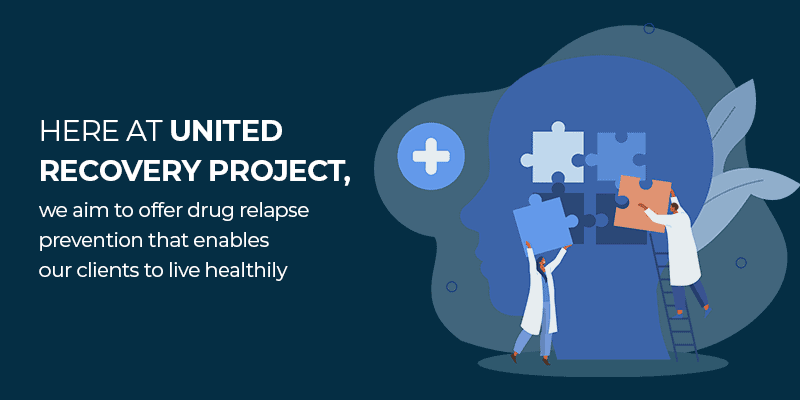Drug Relapse Prevention
Table of Contents
Overcoming addiction is one of the most challenging hurdles you’ll encounter in life, and you can’t always get it right the first time. Although some recovering addicts can steer clear from drugs, others may relapse and start using again. Relapse happens to the best of us, and we can’t let it keep us from reaching our long-term goal: lifelong sobriety.
According to the National Institute on Drug Abuse, 40 – 60% of individuals suffering from substance abuse disorder relapse. The high prevalence of relapse is due to the chronic nature of addiction. However, new treatments aim to reduce relapse rates. Recovering addicts can also avoid relapsing by maintaining a support system, practicing self-care, and exercising regularly. Here at United Recovery Project, we aim to offer South Florida drug relapse prevention that enables our clients to live healthy, fulfilling life.
Relapse can occur quickly or over several months. You should seek care as soon as you begin to experience the telltale signs of addiction.

The Stages Of Drug Addiction Relapse
Drug addiction relapse doesn’t happen all at once. In reality, relapse typically occurs in the following three stages:
- Emotional relapse: The first of the three stages is emotional relapse, which typically includes depressive and negative thoughts. For instance, you may no longer realize your self-worth and, in turn, stop practicing self-care. Individuals in the emotional relapse stage may neglect their personal hygiene, stop exercising, and begin to eat unhealthily. Depression, irritability, and anxiety are all associated with emotional relapse. People in the emotional relapse stage typically don’t contemplate using drugs yet. Nevertheless, emotional relapse is a precursor to mental and physical relapse (both can lead to drug use).
- Mental relapse: Mental relapse involves harmful thoughts that are a step above what you experience during emotional relapse. This stage of relapse is often more cumbersome as you begin to think about using drugs again. You may contemplate how using drugs will numb your destructive thoughts and emotions. Some individuals might think about using a small amount of their drug of choice and adopt the mindset that “one won’t hurt.” However, as most recovering addicts know, it’s incredibly challenging to have “just one” without becoming hooked again.
- Physical relapse: Emotional and mental relapse set the foundation for physical relapse. In the physical relapse stage, you start to use drugs again. The harmful thoughts and mental games become overbearing, and you conclude that drugs are the only way to escape them. This might include using a little bit now and then or using the same amount you did when you were a full-fledged addict. Without seeking help as soon as possible, many people will revert to their old ways and become hooked, wiping out their progress in their recovery. Nevertheless, relapse is common, and it’s not the end of your journey (merely a step backward). Once you start using drugs again, you should enter a professional rehabilitation center to detox your body and restart treatment.
How Can You Prevent A Relapse?
At United Recovery Project in South Florida, you’ll learn the best ways to overcome a relapse as you continue your recovery journey living independently. Here’s a look at some of the best relapse prevention tips to maintain sobriety:
- Put yourself first: You should never forget HALT: hungry, angry, lonely, and tired. All of these are essential components of self-care. For some individuals, self-care is more physical than mental and vice versa. One person may just need to exercise and eat healthily, whereas another person could require more emotional support. You can avoid HALT by eating three filling meals daily (hungry), doing activities you enjoy (angry), maintaining a robust support system (lonely), and getting at least 7 to 8 hours of sleep nightly (tired).
- Be mindful of your personal triggers: Triggers tempt you to start using drugs again, and they’re not always easy to recognize. Fortunately, recovering addicts learn the best ways to cope with their triggers in a substance abuse treatment program. Triggers might include simply seeing the drug or revisiting the place where you used to take drugs. A trigger causes you to feel anxious or depressed, prompting you to start using again. Once you know what triggers you, it’s essential to go out of your way to avoid triggers.
- Recognize the consequences of using drugs again: Think back to when you used drugs. How did the drugs impact your health, finances, and relationships with family and friends? Everything in life has consequences, and drugs are no exception. Reminding yourself of what it was like when you took drugs can help deter you from using again. You should also think about how much progress you made and all the positive aspects of sobriety. Relapsing will wipe out all your hard work, and you’ll have to start at ground zero.
- Maintain a support group: Sobriety is a lifelong journey that requires continuous support. After leaving substance abuse treatment, you should participate in a support group with other recovering addicts. Such a group gives you the chance to share your challenges and success and make friends. You should also keep a good relationship with family and friends that back your recovery journey.
- Identify the three stages of relapse: As mentioned, there are three stages of relapse: emotional, mental, and physical relapse. These stages don’t all happen at once, so you still have time to curb the relapse if you notice one of the stages. If you start to experience the emotional and mental signs of relapse, you should seek help as soon as possible (don’t ignore the warning signs). It’s much easier to get back on track before you hit the physical stage – the stage where you start using again.
- Adopt healthy habits: While it might sound vague, it’s critical to adopt healthy habits to accompany your newfound sobriety. Adopting healthy habits includes eating nutritional food, exercising regularly, maintaining a consistent sleep schedule, and keeping your mind active. When you feel good mentally and physically, you’re less likely to return to your old ways.
While there’s no perfect way to avoid relapse, the above tips and tricks can help you avoid triggers and improve your chances of maintaining lifelong sobriety.
United Recovery Project’s Florida Drug Relapse Prevention
Relapse doesn’t mean you’ve failed – it’s merely a roadblock on your recovery journey. With a little bit of help and determination, you can get back on track and curb your drug addiction. United Recovery Project has a South Florida luxury addiction treatment program that offers personalized care in state-of-the-art facilities. If you have relapsed or feel vulnerable to relapsing,
to learn more about our substance abuse treatment.
- Programs
- Women’s Detox Program
- Prescription Drug Detox Program
- Opioid Detox Program
- Opiate Detox Program
- Men’s Detox Program
- Meth Detox Program
- Medical Detox Program
- Holistic Detox Program
- Heroin Detox Program
- Drug Detox Program
- Relapse Prevention
- Psychotherapy Program
- Nutritional Education
- LGBTQ-Friendly Program
- Group Therapy
- Dialectical Behavior Therapy
- Cognitive-Behavioral Therapy
- Anger Management Therapy And Substance Abuse Detox
- 12 Step
- Detox Therapy Programs
- Alcohol Detox Program
- Cocaine Detox Program
- Benzo Detox Program
- Women’s Rehab Center
- Transitional Living Program
- Transitional Living Program
- Sober Living Homes
- Residential Rehab Programs
- Residential Addiction Rehab
- United Recovery Project | Drug Relapse Prevention
- Alcohol Detox Center
- Alcohol Detox Center
- Rehab Alumni Program
- Rehab Aftercare Program
- Rehab Aftercare Program
- Partial Hospitalization Program
- Outpatient Drug and Alcohol Rehab
- Medical Detox Center
- Intensive Outpatient Program (IOP)
- Holistic Drug Detox
- Heroin Detox Center
- Heroin Detox Center
- Dual Diagnosis Programs in New Jersey
- Drug Relapse Prevention in New Jersey
- Dual Diagnosis Programs in New York
- Drug Relapse Prevention in New York
- Dual Diagnosis Programs
- Drug Relapse Prevention
- Drug Relapse Prevention
- Rehab Alumni Program
- Alcohol and Drug Addiction Aftercare Programs
- Women’s Rehab Center
- Sober Living Homes
- Residential Rehab Programs
- Dual Diagnosis Programs
- Outpatient Drug and Alcohol Rehab
- Intensive Outpatient Program (IOP) For Addiction
- Partial Hospitalization Program (PHP)
- Residential Addiction Rehab
- Holistic Drug Detox
- Medical Detox Center
